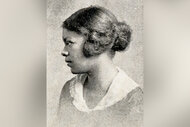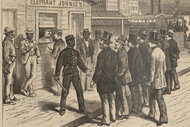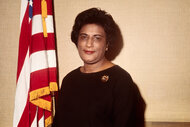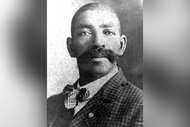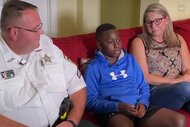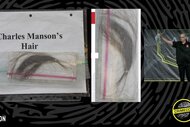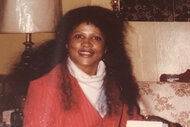Create a free profile to get unlimited access to exclusive videos, breaking news, sweepstakes, and more!
'You Don’t See Them On The News:' How Two Sisters-In-Law Launched A Nonprofit To Help Find Missing Black People
News coverage for missing persons is even more scarce in the coronavirus pandemic, according to the co-founders of the Black and Missing Foundation.

Tamika Huston, a 24-year-old Black woman, was reported missing in May 2004 in Spartanburg, South Carolina. Her boyfriend, Christopher Hampton, confessed to killing her the following year and was later sentenced to life in prison.
But it wasn’t widespread, national news coverage of Huston’s case that caught the eye of Natalie and Derrica Wilson. Instead, the sisters-in-law say it was the scant reporting while Huston was considered missing that gave them pause.
“We definitely didn’t see people that looked like us on the news,” Natalie Wilson told Oxygen.com. “Derrica and I said, ‘why not us? Why should we wait for someone else to do something?’”
Natalie Wilson worked in public relations and Derrica Wilson had previously worked in law enforcement. Nearly 13 years ago, they decided to use their expertise in both fields to launch the nonprofit Black and Missing Foundation.
“Our mission is to help us find us,” Natalie Wilson said.
In 2019, 609,275 people were reported missing in the United States, according to FBI data. Asian, Black, and Indian people together make up nearly 40 percent of all reported cases. Although Black people account for only 13 percent of the United States population, they amount to 205,802 reported entries in the National Crime Information Center’s database.
“Forty percent of all persons missing are of color, and that’s the inspiration behind it,” Natalie Wilson said. “The motivation to keep going are these families that are desperately needing our help to find their missing loved ones.”
Part of their focus is getting the word out about the missing as quickly as possible.
“We can’t wait for the 5 o’clock, 6 o’clock news cycle,” Natalie Wilson said. “We definitely utilize social media to bring awareness to these cases.”
They also assist families by providing financial support to print flyers within local communities and sometimes even pay for burial services if a missing person is found deceased.
“Missing persons is not a Black issue, it’s not a white issue,” Derrica said. “It’s an American issue, and families need to have these uncomfortable conversations in their households.”
To combat the disparity in news coverage and systemic racism impacting these cases, Natalie Wilson says there is a need for more diversity in newsrooms and for law enforcement to correctly categorize cases.
“Our stories are not being told…are not being shared,” she said. “It starts at a lower level, which is with law enforcement…as to how they are classifying these cases. Oftentimes when our children are reported missing they’re classified as a runaway, so you do not receive an Amber Alert or any type of media coverage. We definitely have to take a look at how we are systematically classified as being involved with some type of criminal activity or as a runaway.”
In 1990, two missing Georgia twins were labeled as runaways. Then their names were incorrect on a missing person’s report, according to the Fall Line Podcast. The case of the 15-year-old twins, Dannette and Jeannette Millbrook, was the focus of the Oxygen special “The Disappearance of the Millbrook Twins.” The sisters have never been found and no arrests have been made in connection to their case.
Derrica Wilson previously worked for the Arlington County Sheriff’s Department in Virginia and the City of Falls Church Police Department. She says sensitivity training and ensuring investigators take Black missing persons cases seriously is critical to helping families locate their loved ones. She says that a wide swath of Black adults go missing across America, and there’s little follow-through on locating them.
“There’s no focus on these missing mothers, fathers, aunts, uncles, grandparents…and our children,” she said. “We wanted to holistically cover all of our missing persons because we wanted to even the playing field.”
And now, a key area where the foundation tries to provide support — pushing for more news coverage — has been crowded by the COVID-19 pandemic and heavy coverage of the election and its aftermath.
“We’re dealing with two pandemics,” Derrica said. “We have the COVID-19, but we also have the pandemic of missing persons. Our numbers have increased, and sadly a lot of these cases are not being featured in the media outlets because of everything else that is happening around us with the pandemic and the recent election.”
The foundation posts missing persons on the foundation’s website. It also accepts anonymous tips and provides families looking for resources with information on what to do if a loved one goes missing.

